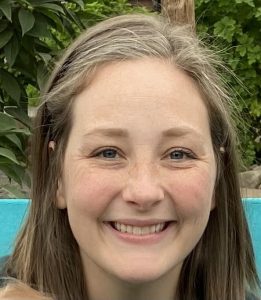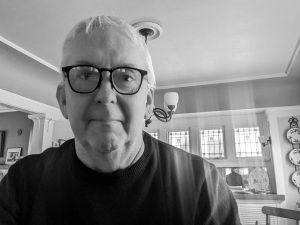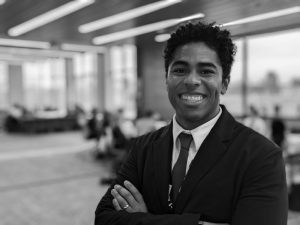Hayley Kutz: English I, Themes of Poetry and Prose, AP English

Hayley Kutz, English teacher, is in her 11th year of teaching. She began her education at the University of Wisconsin-Milwaukee, where she earned two bachelor’s degrees: one in English, and the other in Early Adolescence-Adolescence education. Kutz then went on to earn her master’s in education from the University of Wisconsin-La Crosse.
For Kutz, being a great teacher is being willing to change and adapt. Her teaching philosophy revolves around a single principle: listen more than you speak.
“[I want to make] sure that what I’m doing is what my students need, and that I’m fitting the needs of my students – listening, being adaptable, hearing students when they’re telling me what they need,” Kutz said.
Beyond the classroom, Kutz finds solace in life’s simple pleasure – sleep, a good dose of Survivor, and spending time with her kids.
When asked about the one book she’d choose to teach above all others, Kutz promptly identifies Romeo and Juliet. She enjoys observing how students, initially skeptical, can discover the humor and accessibility of Shakespeare and come to love the Bard’s work.
“Kids always think that they’re going to hate it, and then we read it and they realize how funny it is, and how ridiculous it is, and that they can understand Shakespeare,” Kutz said. “I think it gives kids a lot of confidence, too.”
Kutz’s journey to Shorewood began with some navigational challenges, but she was committed to finding a place where she could thrive as an educator. Her passion for teaching stems from a deep belief in the potential within young people.
“In terms of themselves, I hope that my students know that they are far more capable than they think they are, and they can do anything that they put their mind to, even if it seems difficult or they have anxiety about it,” Kutz said. “I hope they remember that I’m [their] favorite teacher they ever had.”
Kutz also acknowledges the emotional toll teaching can have, requiring a near-constant pouring out of oneself. Despite loving her job, she must also navigate the complexities of being a person beyond her role.
“It’s a lot,” Kutz said. “Teachers are doing their best…We’re human, we’re trying just as much as everyone else.”
Looking ahead, Kutz’s vision for the future of education is a better-funded and more equitable system, one that not only affords opportunities to all but also meets students where they are. She advocates for an accessible and empowering education system in which every student has the chance to succeed, regardless of external circumstances.
Michael Halloran: English I, Visual Journalism, American Literature

Michael Halloran, English teacher of 28 years, began his higher education pursuing a dual degree in English and Political Science at Madison. He then moved to Door County where he laid down roots, started a family, and worked in the culinary sector. There, he found success, but a yearning for something beyond it persisted. He was, he realized, at a crossroads.
“I knew I was at a point in the restaurant business where I either had to put my own money into it – own my own place – or move on,” Halloran said. “But I also knew that I wasn’t properly motivated by profit, so I wasn’t going to be a very effective business owner.”
So Halloran chose the latter, and it felt like a homecoming. He took a cut in pay and began pursuing a bachelor’s degree in education at the University of Wisconsin-Milwaukee.
His passion for teaching began early, he reflects, with his involvement in liturgy planning at his Catholic high school, where he and his classmates would carefully select the passages to be read at each week’s congregation.
“I think there’s something primal about stories and literature, and that kind of transposing-transporting effect it can possibly have on people,” Halloran said. “I can pick some of these words, and show them to other people, and that [will] move them.”
Halloran envisions the classroom as a space where young people can process the knowledge of the past, refine it, and direct it to contribute meaningfully to the world.
“There’s something brand-new and exciting about that discovery that young people have, that, as they get inspiration from things they read and people they encounter, so too can they give it later,” Halloran said.
For Halloran, such is the essence of teaching: the past informs the present, and the present shapes the future.
“That’s kind of what I feel like I’ve done as a teacher, and what people around me are doing all the time,” Halloran said. “Watching young people process the influence that other people and other forces have on them, and translating that into acting in ways that influence others.”
Perhaps most rewarding for Halloran are those “aha” moments, the breakthroughs that occur after a student has wrestled with a concept for a while and finally manages to pin it down.
“It doesn’t happen very often, but when I see…the individual kid who has struggled and struggled and struggled with the material, and has a moment where things break open and make sense, and that moment sticks,” Halloran said. “That is always inspiring to me.”
Halloran also acknowledges the lack of a one-size-fits-all approach to connecting with students. He sees himself as a perpetual learner in this sense, continuing to experiment, adapt, and evolve.
“You’re always learning how to reach kids that you’re not naturally reaching,” Halloran said. “There’s no simple, easy cure for that. There’s just that honest attempt to come to know that person and to see what you can do for them. That’s something I’m constantly learning, and always feel like a newbie at.”
If his teaching style were a literary genre, Halloran says it would be mystery.
“Like, how the hell does this guy get this job done?” Halloran said.
He says the three items he always keeps in his classroom are his trusty laptop, the text(s) he is teaching, and a towering stack of graded quizzes and assignments, never to be returned to their rightful owners.
Beyond the curriculum, Halloran wants to instill in his students a sense of perspective. He urges them to slow down, savor the journey, and find within it the power to shape their futures.
“I just want them to recognize that where they are now is not where they’re going to be in a year, or three years, or 10 years,” Halloran said. “They really do have a lot to say where they’re going to be, [and] what they do and how they do it makes a difference in all of that.”
Halloran expresses concern at the increasing polarization and divisive financial struggles within public education – a consequence, he believes, of harmful decisions made by those in higher positions.
“If you don’t stop starving public education, it’s just going to continue to decline,” Halloran said. “Even if [someone’s] never had kids that went to Shorewood, [they would still get] a higher price value on their home and a safer community to live in because there’s strong public schools. I wish we could get a lot of people to recognize that and support it.”
Jesse Perez: American Society, Civics

Jesse Perez, social studies teacher, didn’t always envision himself in front of a classroom. He began his academic journey in his hometown of Elgin, IL, where he earned a bachelor’s degree in History on the pre-law track from Judson University. With his sights set on law school, the road ahead seemed clear.
After graduation, however, Perez took a job at the Boys and Girls Club of Elgin, intending for it to be a temporary source of income while he contemplated his next move. It was there, however, that Perez discovered his true calling – working with young people.
Despite warnings from a skeptical professor against entering the field of education, Perez doubled down. Looking back, he realized that his desire to impart knowledge had been present from much earlier in his life, going back to his childhood days spent patiently teaching his mother video game mechanics or demonstrating tennis skills for his peers.
Today, nearly a decade into teaching, Perez continues to find fulfillment and meaning in his work. Currently, he is working towards a master’s degree in American History and Government through the James Madison Fellowship, a full-ride graduate program at Ashland University in Ohio and Georgetown University in Washington, D.C.
On an everyday basis, though, he finds great enjoyment in interactions with students. He particularly enjoys being able to teach the new Civics course.
“I’m having a lot of fun right now with the stuff that we’re doing…teaching kids about some of the founding principles behind government…learning about constitutionalism and federalism,” Perez said. “That’s been really fun.”
At the heart of Perez’s core philosophy lies the student.
“The idea of student-centered learning is going to help the teacher redefine the process from their perspective,” Perez said. “Making things student-centered is a big part of what I try to do.”
Perez hopes to use his classroom, adorned with various memorabilia related to his interests – tennis, manga, and movies, among others – as a means of making deeper connections with students. By showing parts of his life, he hopes they will, in turn, feel invited to share parts of theirs.
“[I love] having my own space that I can decorate and be able to be vulnerable in and share with the students, and having my speaker so that I can play music for the kids, and so that they can also share music that they like with me,” Perez said.
He also hopes to cultivate his room into a space where students build off of each other.
“I think that students are learning when they are engaging with not only me but also when they’re engaging with one another about the topics,” Perez said. “Collaboration is the best indicator of learning.”
Perez’s philosophy also revolves around an acknowledgement of fallibility and the fostering of an environment where both he and his students are able to make mistakes.
“A valuable lesson that I’ve learned from students is not to always assume that I am right,” Perez said. “Just having that humility that, hey, sometimes I’m going to be wrong and that’s totally okay.”
Despite the many rewards Perez feels he has reaped from his profession, he is keenly aware of the challenges faced by educators across the nation along with the disparity between societal appreciation of teachers and the lack of tangible support they receive.
“I wish that people understood that teachers are professionals – some of the most educated members of our society – and yet I feel as though the profession is neglected,” Perez said. “Most people value it, but they don’t truly put their money where their mouth is.”
